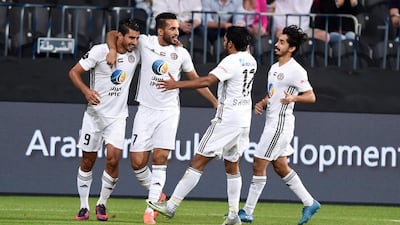ABU DHABI // Al Jazira underlined their status as Arabian Gulf League title challengers with a convincing 2-0 win over champions Al Ahli on Saturday night at the Mohammed bin Zayed stadium.
UAE striker Ali Mabkhout provided Jazira with the perfect start when he put the home side ahead on the 10th minute before Khalfan Mubarak doubled the lead on 35 minutes.
Mark Boussoufa, the Moroccan international, was given his marching orders after a second bookable offence on the 66th minute, but that did not diminish Jazira’s spirit as they put up a solid defence to hold the Ahli attack at bay.
The result took Jazira’s tally to 17 points and consolidated second position, one behind Al Wasl.
Meanwhile, Al Wahda were left to rue two missed penalties in a 1-1 draw with Kalba.
Sebastian Tagliabue’s kick was saved by Kalba goalkeeper Ibrahim Essa in added time of the first half and Ismail Matar sent his effort wide in the 90th minute.
Both teams had a player sent off in late on: Kalba’s Yaqoub Al Blooshi was shown a second yellow card in the 84th minute before Tagliabue was sent off five minutes later.
While Wahda were wasteful, it was the visitors who struck first through Modibo Maiga. Mohammed Al Menhali levelled seven minutes later.
Javier Aguirre, the Wahda manager, said he “lost two years of his age”.
“We lost two points,” he said. “It is not normal that you miss penalties but it was one of those days that nothing went right for us. We missed easy goals including two penalties. Their goalkeeper was outstanding.
“In our last match against Sharjah, we had less shots at goal than this game but scored seven. We had at least 10 scoring opportunities in this game and we couldn’t win.”
Follow us on Twitter @NatSportUAE
Like us on Facebook at facebook.com/TheNationalSport


